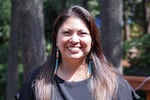Inside a room at the Cow Creek Band of Umpqua Tribe of Indians’ new tribal community center are three framed sketch drawings by a Native artist.
K’Ehleyr McNulty, the tribe’s youth development specialist, pointed to a drawing of a traditional Cow Creek home — a plankhouse, with planks partially in the ground.
“That keeps you warmer in the winter and cooler in the summertime,” McNulty explained.
Another sketch depicted life near the river. A third showed a woman cooking camas root. McNulty said the images will be a part of a local lesson on traditional ways of living and the technologies the Cow Creek people used.
“Just because it happened in the past doesn't mean it was primitive,” McNulty said.
McNulty is part of a team collaborating with the South Umpqua School District on curriculum specific to the Cow Creek tribe. It’s one element of a major change for Oregon’s public schools: Starting this year, Oregon schools are required to teach tribal history and the Native American experience in class.
The curriculum will roll out as 45 lessons for fourth, eighth and 10th grade classrooms, with plans to add more grades in the future.

A sketch of a plankhouse hangs at the Cow Creek Band of Umpqua Tribe of Indians tribal community center in Myrtle Creek, Ore., Sunday, Aug. 28, 2019. Oregon schools are now required to teach historically accurate, culturally sensitive and contemporary curriculum on Native American peoples of the Northwest.
Elizabeth Miller / OPB
Signed in 2017, Senate Bill 13 requires the curriculum, called "Tribal History/Shared History." It's part of the state's strategy to implement "historically accurate, culturally embedded, place-based, contemporary, and developmentally appropriate" American Indian and Alaska Native curriculum.
The curriculum won’t be available until January and there’s a lot of work to be done before then.
45 lessons from English to math
The lessons will be taught in five subject areas — from English and social studies to math and science.
Nine “essential understandings” serve as the foundation for the lessons. They’ll range from language and sovereignty to sensitive topics like identity and "genocide, federal policy and laws.”
“It's really focusing on Indigenous ways of knowing, thinking and doing,” said April Campbell, the Indian education adviser to Oregon’s deputy superintendent of public instruction.
This is the first time the Oregon Department of Education has been responsible for creating curriculum.
“That’s more of a local control task,” Campbell said.
To write the curriculum, ODE contracted with Education Northwest and consultant Shadiin Garcia.

Shadiin Garcia, a consultant for Education Northwest, at the South Umpqua School District office in Myrtle Creek, Ore., Sunday, Aug. 29, 2019. Garcia will help develop four local, tribe-specific sets of lessons for the Cow Creek Band of Umpqua Tribe of Indians, Confederated Tribes of Siletz Indians, Burns Paiute of Harney County and the Coquille Indian Tribe.
Elizabeth Miller / OPB
For Garcia and Campbell, the curriculum represents more than a few new lessons. It has the ambitious goal of giving students an accurate representation of the life of Native people in Oregon.
“It actually enhances and corrects and addresses the misconceptions and the current erasures in curriculum across five subject areas,” Garcia said.
They say the lessons will align with state standards and objectives.
“We’re hoping that these are flexible enough where educators, teachers can implement fairly easily with their existing curriculum in the classroom,” Campbell said.
In addition to the state-mandated lessons, school districts located around Oregon’s nine tribes will also have access to localized material, like the sketches being incorporated in the Cow Creek lessons. The idea is for students to learn about their Native neighbors and how they live today.
Value for Oregon’s Native American students
As a tribal advocate for South Umpqua School District, Renae Guenther works on boosting Native American student attendance by bringing in speakers and hosting cultural events for the community. She’s also a Cow Creek tribal member and is working with the tribe’s youth development specialist, McNulty, to bring tribal lessons to South Umpqua schools.
Guenther has a very personal stake in it, too. She has two young sons who will receive this instruction in schools alongside non-Native classmates.
“It gives me hope for their education and for them to feel accurately represented,” Guenther said.
She hopes the Cow Creek curriculum will teach the broader community about the tribe in their backyard.
“Most of the kids and even the general public will relate the tribe to the Seven Feathers casino,” Guenther said. “It's important for our kids and our youth to know that there's more to the tribe than just the casino and to fill that accurate representation.”

Renae Guenther, tribal advocate for the South Umpqua School District, at the district offices in Myrtle Creek, Ore., Sunday, Aug. 29, 2019. Guenther is a member of the Cow Creek Band of Umpqua Tribe of Indians and works on boosting attendance of Native American students at school.
Elizabeth Miller / OPB
As a consultant for Education Northwest, Shadiin Garcia will help develop four local, tribe-specific sets of lessons, for Cow Creek, the Confederated Tribes of Siletz Indians, Burns Paiute of Harney County and the Coquille Indian Tribe.
Some communities have had curriculum for years.
The Confederated Tribes of Grand Ronde has a curriculum specialist who created tribal history lessons for fourth and eighth grade, which were tested in 2016 in the Willamina School District.
For districts not located near tribal communities, their students may still receive lessons specific to each of Oregon’s tribes.
“The long-term goal is Oregon Department of Education is going to — with permission from the nations — make available the content from all the nine nations,” Garcia said.
But when it comes time to actually teach the lessons in a classroom, educators have a lot to learn and maybe unlearn.
Unlearning bias through teacher training
Teacher training is not required for school districts, but Oregon's bill requires the state education department to make professional development available and to help districts if they ask.
But at this point ODE is just as unfamiliar with providing professional development for its new curriculum as it is with creating the curriculum itself.
“This is all kind of paving the road as you’re walking down it,” Campbell said.

The South Umpqua School District service center in Myrtle Creek, Ore., Sunday, Aug. 29, 2019. The district will soon implement curriculum developed in collaboration with the Cow Creek Band of Umpqua Tribe of Indians.
Elizabeth Miller / OPB
The bill requires ODE to help train teachers on the new curriculum. State officials are lining up professional development opportunities and hiring a consultant to provide more training.
ODE is also getting some help from educational service districts around the state and using a “train the trainer” model between teachers.
“So if you’re over in Harney County, you could contact someone from Harney County and they would have that foundational knowledge to help roll this out,” Campbell said.
Some districts are partnering with others.
The South Umpqua School District serves 1,500 students from Myrtle Creek, Tri-City and Canyonville. They’re working with Garcia to train staff over seven half-days throughout the year.
The district is using the sessions to expand beyond the tribal history and culture lessons to delve into racially sensitive topics, such as cultural appropriation, implicit bias and microaggressions.
“Rather than plopping the curriculum down in front of our teachers and just saying, 'Go teach this,' we're actually providing them monthly background and the knowledge to really understand the curriculum that they're teaching,” said Andy Johnson, director of student achievement for South Umpqua.
Because of the professional development, South Umpqua students won’t learn the new curriculum until next year. But for Johnson, the delay is worth it to make sure students learn effectively.
“We want to roll it out in a way that is correct and is sensitive and that our teachers really understand what they're doing so it can be effective and not be offensive in any way,” Johnson said.

K'Ehleyr McNulty displays a portion of the new Cow Creek Band of Umpqua Tribe of Indians curriculum at the tribal community center in Myrtle Creek, Ore., Sunday, Aug. 29, 2019. McNulty is part of a team helping to develop the curriculum for South Umpqua School District.
Elizabeth Miller / OPB
The extra year also gives teachers time to adjust, Guenther said.
“They’re going to have to relearn all of that on top of what they already do," Guenther said, "and they already don’t have time.”
Guenther suggests teachers may also need to unlearn their own bias and personal learning experiences from the past.
With a new curriculum comes the potential for pushback. McNulty said she’s met teachers excited for the curriculum, but she also recalled a meeting with a few teachers wary of a new requirement.
“We're not trying to attack anybody with this curriculum," McNulty said. "It is just a better lens and a more open, more well-rounded lens of history and modern day.”

K'Ehleyr McNulty at the Cow Creek Band of Umpqua Tribe of Indians tribal community center in Myrtle Creek, Ore., Sunday, Aug. 29, 2019. McNulty said some teachers are excited for the new Cow Creek-specific curriculum but others are wary of a new requirement.
Elizabeth Miller / OPB
Garcia’s biggest concern is educators thinking they’re on their own to present these brand new lessons without the necessary support.
“Educators have the choice to take what’s put in front of them and enter it with integrity and purpose,” Garcia said. “Or they can choose to say, 'Oh, it’s just another mandate.'”

